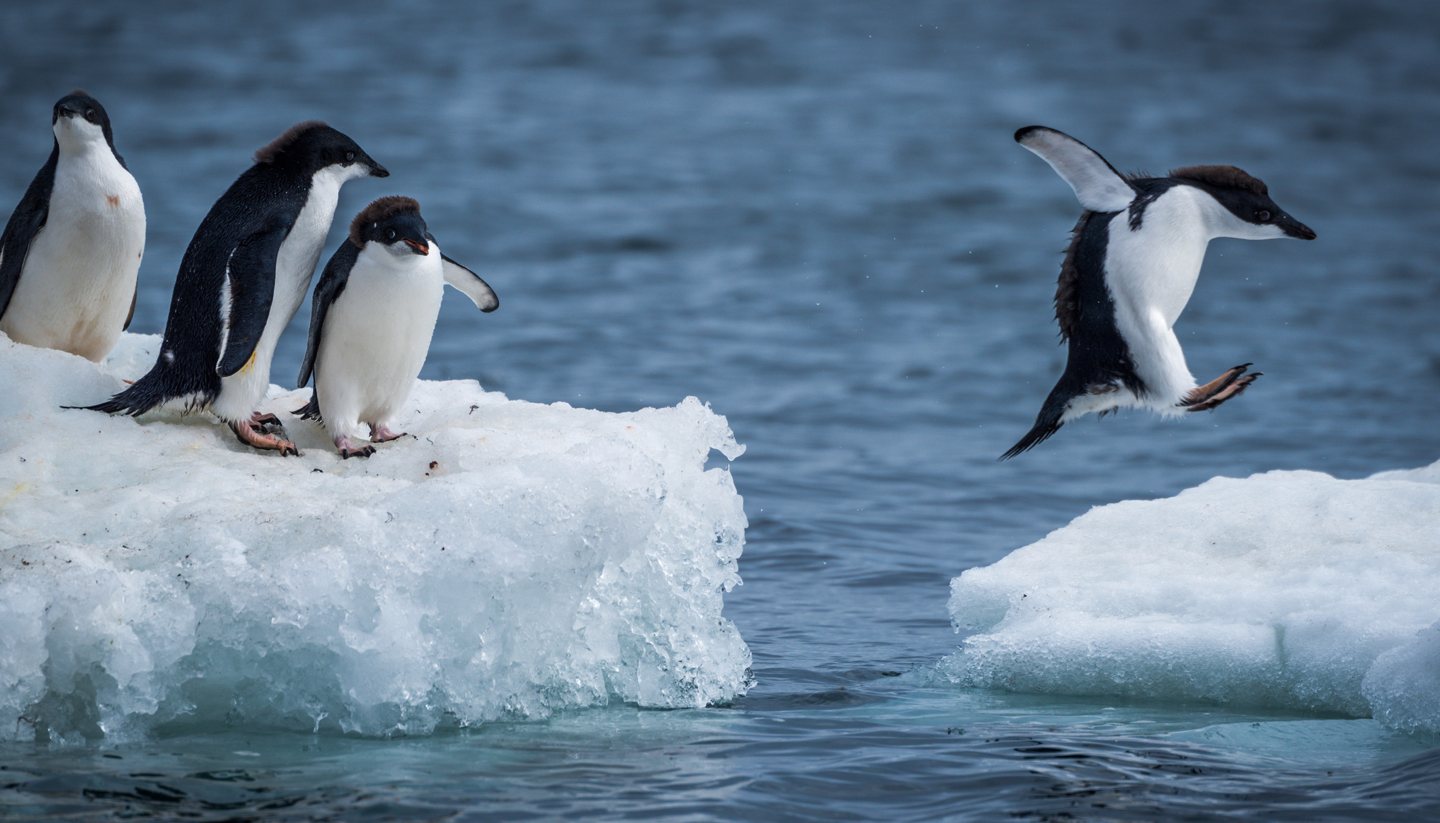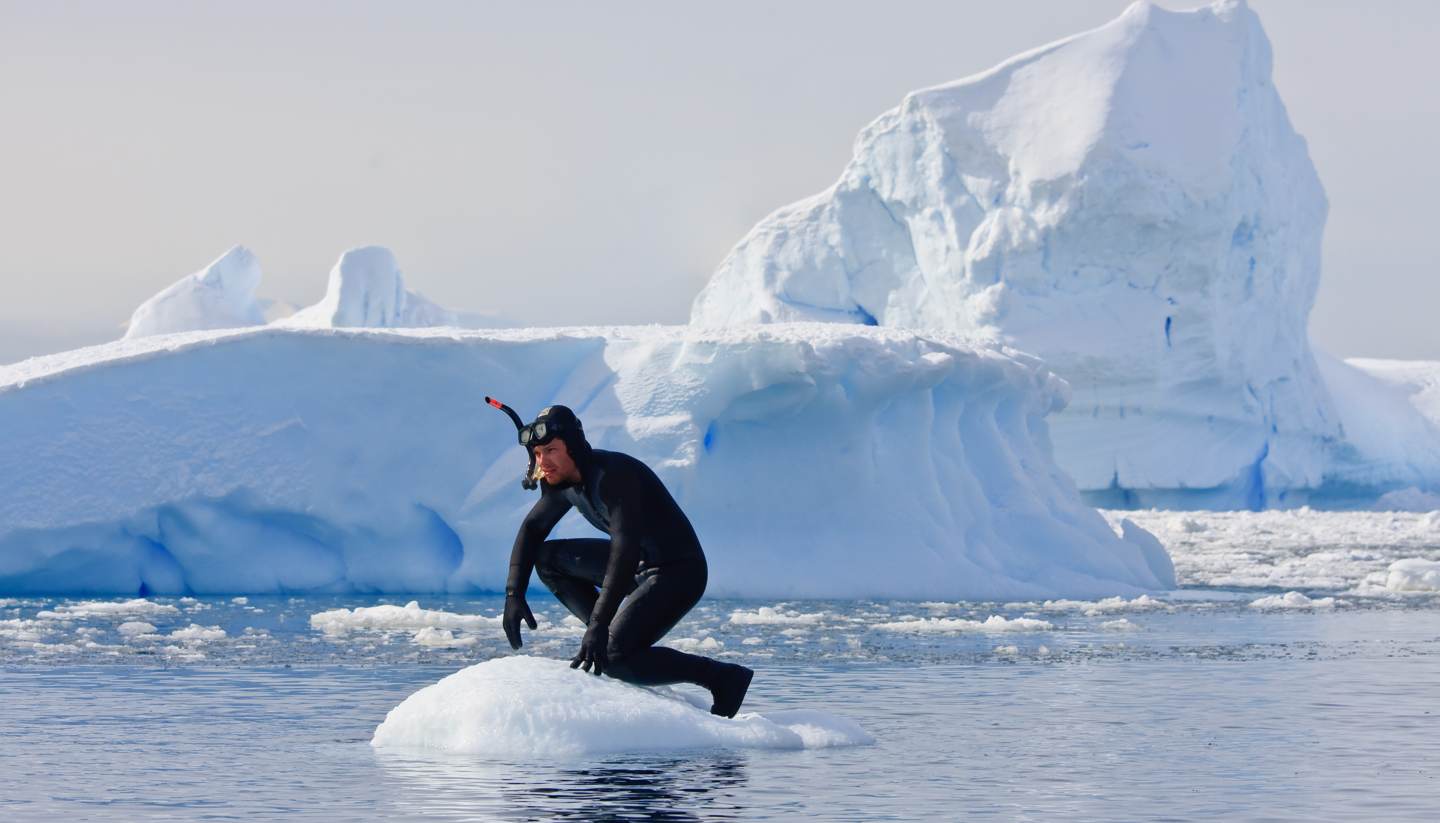Antarctica travel guide
About Antarctica
Amidst the solitude of Antarctica, adventurous travellers can discover an ethereal landscape that lingers in the memory. Very few have ventured onto this appealingly inaccessible continent, but those who have rave about the privilege of gazing upon towering mountains, bulky glaciers and luminous, dreamlike icebergs. Perhaps more than anywhere else, Antarctica reminds those who visit it of the awesome (and savage) power of nature.
Antarctica is welcoming more tourist-orientated cruises and ferries to the region every year, and facilities are continually developing, with more accommodation, culinary and travel options available. There is now ample opportunity to ascend Mount Erebus, the southernmost active volcano on Earth; to fly via helicopter or venture by boat to penguin colonies; and to really make the most of a terrain that teems with wildlife, with a multitude of birds, seals, albatrosses and enormous whales.
Some argue that Antarctica is changing, and by man-made causes rather than natural ones. Many regard the increasing focus on tourism as disconcerting and wish to preserve Antarctica in its elemental state to avoid any potential environmental damage. Antarctica is still a magical experience that most, given the chance, would find hard to resist. Those who do visit should be aware of their impact upon the landscape and do their utmost to limit the effect of their stay.
Perhaps the reason behind the fascination with Antarctica is its function as a symbol of endurance and survival. Before Antarctica was first spotted (in 1819), the continent was the subject of constant speculation, spoken of in almost mythical terms as Terra Australia Incognita (The Unknown Southern Land). Humans first occupied the continent in 1899, but Antarctica seemed inhospitable and incomprehensible and, in many ways, it still is.
Key facts
14,000,000 sq km (5,405,430 sq miles).
0.
Antarctica has no government and is regulated under the Antarctic Treaty System.
Travel Advice
If you plan to pass through another country to return to the UK, check the travel advice for the country you’re transiting.
It is more important than ever to get travel insurance and check it provides sufficient cover. See the FCDO’s guidance on foreign travel insurance.
The British Antarctic Territory is a British Overseas Territory administered from London. There is no formal British diplomatic or consular representation in the British Antarctic Territory.
You may need a permit issued by the Foreign, Commonwealth & Development Office (FCDO) if you’re organising a trip to Antarctica, including the British Antarctic Territory. See Permits.
Consider travelling with a company affiliated to the International Association of Antarctica Tour Operators, whose members sign up to codes of practice on operational and environmental safety.
Tour operators have their own guidelines for certain types of adventure activities. These can vary between operator and may be different to those applicable in the UK, or unique to Antarctica. If in any doubt about safety, you should check with your tour operator.
The British Antarctic Territory is inaccessible during the winter (March-October). During the rest of the year there will be times when landings may be difficult due to weather conditions. See Local Travel.
Although there’s no recent history of terrorism in the British Antarctic Territory, attacks can’t be ruled out. See Terrorism.
Crime
There’s no history of crime within the Territory. The Territory has no indigenous population and the only residents are personnel who work at the few scientific research stations in the Territory.
Local travel
There are no scheduled air links to the Territory and there are no road links within the Territory.
Almost all access to Antarctica is by sea only.
In winter (March-October) the Territory is inaccessible. During the Austral summer (November-February) there will be times when, because of the prevailing westerly winds and lack of sheltered anchorage, landings may be difficult.
Although there’s no recent history of terrorism in the British Antarctic Territory, attacks can’t be ruled out.
UK Counter Terrorism Policing has information and advice on staying safe abroad and what to do in the event of a terrorist attack. Find out how to reduce your risk from terrorism while abroad.
There is a high threat of terrorist attack globally affecting UK interests and British nationals, including from groups and individuals who view the UK and British nationals as targets. You should remain vigilant at all times.
The British Antarctic Territory is a British Overseas Territory. The Territory has its own laws and is administered by a Commissioner, based in London. Further information can be found on the British Antarctic Territory website.
LGBT+
Same sex marriage has been legal in the British Antarctic Territory since 2014. Further information can be found on the British Antarctic Territory website. See our information and advice page for the LGBT community before you travel.
This page has information on travelling to Antarctica/British Antarctic Territory.
This page reflects the UK government’s understanding of current rules for people travelling on a full ‘British Citizen’ passport from the UK, for the most common types of travel.
The authorities in the British Antarctic Territory set and enforce entry rules. For further information contact the embassy, high commission or consulate of the country or territory you’re travelling to. You should also consider checking with your transport provider or travel company to make sure your passport and other travel documents meet their requirements.
Permits
Before travelling to the British Antarctic Territory, and the wider continent of Antarctica, you may need a valid permit which your travel company may obtain from the Foreign, Commonwealth & Development Office in London.
Passport validity
There are no specific passport validity requirements for the British Antarctic Territory, although to fly to the continent or to depart for the Antarctic from another country (e.g. Chile, Argentina) British nationals will need a valid passport.
Contact details
Government of the British Antarctic Territory
Polar Regions Department
Overseas Territories Directorate
Foreign, Commonwealth Development Office
London SW1A 2AH
Tel: 020 7008 1639
Email: <polarregions@fcdo.gov.uk>
Office Hours (GMT): Mon-Fri: 9am – 5pm
www.britishantarcticterritory.org.uk
If you have a health condition, or you are pregnant, you may need specialist healthcare abroad. Check whether your destination country can provide the healthcare you may need and ensure you have appropriate travel insurance for unexpected medical evacuation or local treatment.
See the Coronavirus travel health and Healthcare sections in the Coronavirus page for COVID-19 health information.
At least 8 weeks before your trip, check the latest country-specific health advice from the National Travel Health Network and Centre (NaTHNaC) on the TravelHealthPro website. Each country-specific page has information on vaccine recommendations, any current health risks or outbreaks, and factsheets with information on staying healthy abroad. Guidance is also available from NHS (Scotland) on the FitForTravel website.
General information on travel vaccinations and a travel health checklist is available on the NHS website. You may then wish to contact your health adviser or pharmacy for advice on other preventive measures and managing any pre-existing medical conditions while you’re abroad.
The legal status and regulation of some medicines prescribed or purchased in the UK can be different in other countries. If you’re travelling with prescription or over-the-counter medicine, read this guidance from NaTHNaC on best practice when travelling with medicines. For further information on the legal status of a specific medicine, you’ll need to contact the embassy, high commission or consulate of the country or territory you’re travelling to.
While travel can be enjoyable, it can sometimes be challenging. There are clear links between mental and physical health, so looking after yourself during travel and when abroad is important. Information on travelling with mental health conditions is available in our guidance page.
Further information is also available from the National Travel Health Network and Centre (NaTHNaC).
There are very limited medical or search and rescue facilities within the Territory. You should be aware of the harsh climatic conditions in Antarctica.
Make sure you have adequate travel health insurance that specifies Antarctica, in addition to accessible funds to cover the cost of any medical treatment abroad and repatriation.
If you’re abroad and you need emergency help from the UK government, contact the nearest British embassy, consulate or high commission. If you need urgent help because something has happened to a friend or relative abroad, contact the Foreign, Commonwealth & Development Office (FCDO) in London on 020 7008 5000 (24 hours).
Foreign travel checklist
Read our foreign travel checklist to help you plan for your trip abroad and stay safe while you’re there.
Travel safety
The FCDO travel advice helps you make your own decisions about foreign travel. Your safety is our main concern, but we can’t provide tailored advice for individual trips. If you’re concerned about whether or not it’s safe for you to travel, you should read the travel advice for the country or territory you’re travelling to, together with information from other sources you’ve identified, before making your own decision on whether to travel. Only you can decide whether it’s safe for you to travel.
When we judge the level of risk to British nationals in a particular place has become unacceptably high, we’ll state on the travel advice page for that country or territory that we advise against all or all but essential travel. Read more about how the FCDO assesses and categorises risk in foreign travel advice.
Our crisis overseas page suggests additional things you can do before and during foreign travel to help you stay safe.
Refunds and cancellations
If you wish to cancel or change a holiday that you’ve booked, you should contact your travel company. The question of refunds and cancellations is a matter for you and your travel company. Travel companies make their own decisions about whether or not to offer customers a refund. Many of them use our travel advice to help them reach these decisions, but we do not instruct travel companies on when they can or can’t offer a refund to their customers.
For more information about your rights if you wish to cancel a holiday, visit the Citizen’s Advice Bureau website. For help resolving problems with a flight booking, visit the website of the Civil Aviation Authority. For questions about travel insurance, contact your insurance provider and if you’re not happy with their response, you can complain to the Financial Ombudsman Service.
Registering your travel details with us
We’re no longer asking people to register with us before travel. Our foreign travel checklist and crisis overseas page suggest things you can do before and during foreign travel to plan your trip and stay safe.
Previous versions of FCDO travel advice
If you’re looking for a previous version of the FCDO travel advice, visit the National Archives website. Versions prior to 2 September 2020 will be archived as FCO travel advice. If you can’t find the page you’re looking for there, send the Travel Advice team a request.
Further help
If you’re a British national and you have a question about travelling abroad that isn’t covered in our foreign travel advice or elsewhere on GOV.UK, you can submit an enquiry, or contact us on Twitter or Facebook. We’re not able to provide tailored advice for specific trips.



